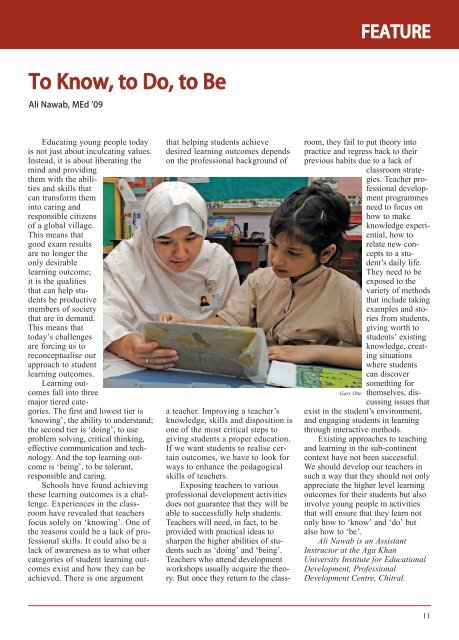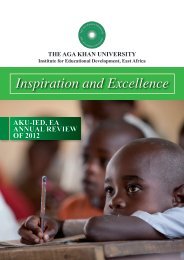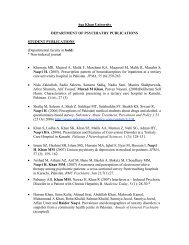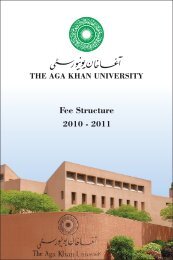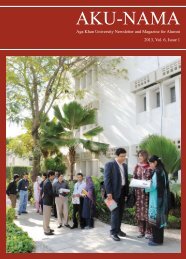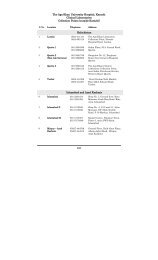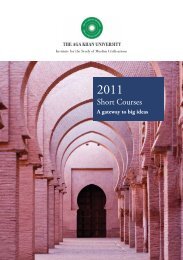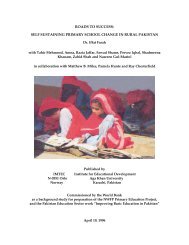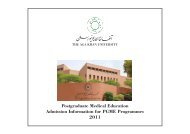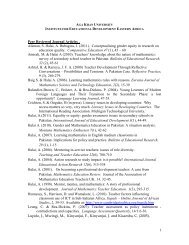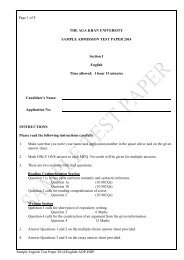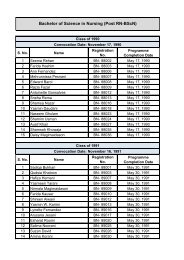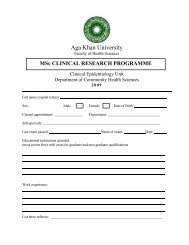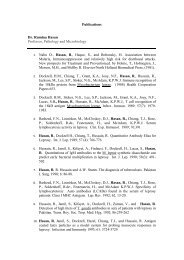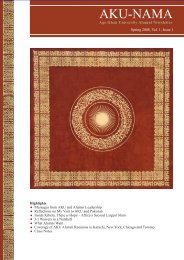Summer 2010, Vol. 3, Issue 1 - Aga Khan University
Summer 2010, Vol. 3, Issue 1 - Aga Khan University
Summer 2010, Vol. 3, Issue 1 - Aga Khan University
Create successful ePaper yourself
Turn your PDF publications into a flip-book with our unique Google optimized e-Paper software.
FeAtureto know, to do, to BeAli nawab, med ’09Educating young people todayis not just about inculcating values.Instead, it is about liberating themind and providingthem with the abilitiesand skills thatcan transform theminto caring andresponsible citizensof a global village.This means thatgood exam resultsare no longer theonly desirablelearning outcome;it is the qualitiesthat can help studentsbe productivemembers of societythat are in demand.This means thattoday’s challengesare forcing us toreconceptualise ourapproach to studentlearning outcomes.Learning outcomesfall into threemajor tiered categories.The first and lowest tier is‘knowing’, the ability to understand;the second tier is ‘doing’, to useproblem solving, critical thinking,effective communication and technology.And the top learning outcomeis ‘being’, to be tolerant,responsible and caring.Schools have found achievingthese learning outcomes is a challenge.Experiences in the classroomhave revealed that teachersfocus solely on ‘knowing’. One ofthe reasons could be a lack of professionalskills. It could also be alack of awareness as to what othercategories of student learning outcomesexist and how they can beachieved. There is one argumentthat helping students achievedesired learning outcomes dependson the professional background ofa teacher. Improving a teacher’sknowledge, skills and disposition isone of the most critical steps togiving students a proper education.If we want students to realise certainoutcomes, we have to look forways to enhance the pedagogicalskills of teachers.Exposing teachers to variousprofessional development activitiesdoes not guarantee that they will beable to successfully help students.Teachers will need, in fact, to beprovided with practical ideas tosharpen the higher abilities of studentssuch as ‘doing’ and ‘being’.Teachers who attend developmentworkshops usually acquire the theory.But once they return to the classroom,they fail to put theory intopractice and regress back to theirprevious habits due to a lack ofclassroom strategies.Teacher professionaldevelopmentprogrammesneed to focus onhow to makeknowledge experiential,how torelate new conceptsto a student’sdaily life.They need to beexposed to thevariety of methodsthat include takingexamples and storiesfrom students,giving worth tostudents’ existingknowledge, creatingsituationswhere studentscan discoversomething forGary Ottethemselves, discussingissues thatexist in the student’s environment,and engaging students in learningthrough interactive methods.Existing approaches to teachingand learning in the sub-continentcontext have not been successful.We should develop our teachers insuch a way that they should not onlyappreciate the higher level learningoutcomes for their students but alsoinvolve young people in activitiesthat will ensure that they learn notonly how to ‘know’ and ‘do’ butalso how to ‘be’.Ali Nawab is an AssistantInstructor at the <strong>Aga</strong> <strong>Khan</strong><strong>University</strong> Institute for EducationalDevelopment, ProfessionalDevelopment Centre, Chitral.11


